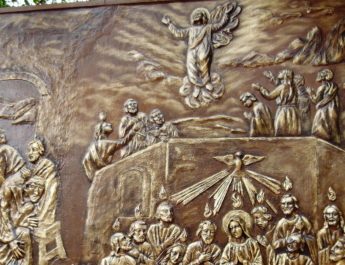Acts 2:14a, 36-41
Eastertide A22
14 But Peter,A standing with the eleven, raised his voice and addressedB them, “MenC of JudeaD and all who liveE in Jerusalem,F let this be known to you, and listenG to what I say.H
A “Peter” = petros. Related to petra (large rock that is connected and or projecting like a rock, ledge, or cliff; can also be cave or stony ground). This is Peter, a stone, pebble, or boulder.
B “addressed” = apophtheggomai. 3x in NT. From apo (from, away from) + phtheggomai (to make a clear sound, proclaim); {related to phegos (light, brightness, splendor); from phaos (light, daylight); from phao (to shine)}. This is to speak clearly, declare.
C “men” = aner. This is man, male, or sir.
D “Judea” = ioudaios. From Ioudas (Judah, Judas); from Hebrew Yehudah (Judah, son of Jacob, his tribal descendants, a name for the southern kingdom. Literally, it means praised); probably from yadah (to throw one’s hands into the air in a gesture of praise); from yad (hand). This is Jewish, a Jew, or Judea.
E “live” = katoikeo. From kata (down, against, throughout, among) + oikeo (to settle or be established somewhere in a permanent way, to make a home or live at home);{from oikos (house – the building, the household, the family, descendants; the temple)}.
F “Jerusalem” = ierousalem.From Hebrew yerushalaim (probably foundation of peace); {from yarah (to throw, shoot, be stunned; to flow as water so figuratively to instruct or teach) + shalem (to make amends, to be complete or sound)}. This is Jerusalem, dwelling of peace.
G “listen” = enotizomai. 1x in NT. From en (in, on, at, by, with) + ou (the ear or hearing). Literally, to give ear, to listen.
H “what I say” = ho + rhema + ego. Literally “my words.” Rhema is from rheo (to speak, command, make, say, speak of); from ereo (to all, say, speak of, tell; denotes ongoing speech). This is word, which implies a matter or thing spoken, a command, report, promise, thing, or business. Often used for narration, commands, or disputes.
36 Therefore let the entire houseI of IsraelJ knowK with certaintyL that GodM has made him
I “house” = oikos. This is house – the building, the household, the family, descendants, the temple.
J “Israel” = israel. From Hebrew Yisrael (God strives or one who strives with God; new name for Jacob and for his offspring); {from sarah (to persist, exert oneself, contend, persevere, wrestle, prevail) + el (God or god)}. This is Israel the people and the land.
K “know” = ginosko. Related to “known” in v14.This is to know, recognize, realize, perceive, learn. It is knowledge gained through personal experience
L “certainty” = asphalos. 3x in NT. From asphales (certain, reliable, secure, definite; literally unfailing – something that is secure because it is solid and constructed on something that will not fall or slip; it is literal or figurative); {from a (not, without) + sphallo (to trip up or fail)}. This is securely in a literal or figurative sense. Also, it’s certainly, steadfastly, or assuredly.
M “God” = theos. From Proto-Indo-European origins, meaning do, put, place. This is God or a god in general.
both LordN and Messiah,O this JesusP whom you crucified.”Q
N “Lord” = kurios. From kuros (authority, supremacy). This is a respectful address meaning master or sir. It refers to one who has control or power greater than one’s own. So, it was also applied to God and Jesus as Master or Lord.
O “Messiah” = christos. From chrio (consecrate by anointing with oil; often done for prophets, priests, or kings). Literally, the anointed one, Christ. The Greek word for Messiah.
P “Jesus” = iesous. From Hebrew Yehoshua (Joshua, the Lord is salvation); {from YHVH (proper name of the God of Israel; the self-existent and eternal one); {from havah (to become) or from hayah (to come to pass, become, be)} + yasha (to deliver, defend, help, preserve, rescue; properly, to be open, wide or free, which implies being safe. So, in a causative sense, this is to free someone). This is Jesus or Joshua in Greek – the Lord saves or the Lord is salvation.
Q “crucified” = stauroo. Related to “standing” in v14. From stauros (upright stake, cross; literally the horizontal beam of a Roman cross, generally carried by the one convicted to die); from the same as histemi (to stand, cause to stand). This can be to attach someone to a cross or fencing with stakes. In a figurative sense, it could be to destroy, mortify, or subdue passions/selfishness.
37 Now when they heardR this, they were cutS to the heartT and said to Peter and to the other apostles,U “Brothers,V what should we do?”
R “heard” = akouo. This is hear or listen, but it also means to understand by hearing. This is where the word “acoustics” comes from.
S “cut” = katanusso. 1x in NT. From kata (down, against, according to, throughout) + nusso (to prick pierce, strike, or nudge). This is to pierce all the way through, prick violently or deeply. It can refer to deep emotional pain.
T “heart” = kardia. Literally the heart, but figuratively mind, character, inner self, will, intention, thoughts, feelings. Also, the center of something. The word heart is only used figuratively in the Old and New Testaments. This is where “cardiac” comes from.
U “apostles” = apostolos. From apostello (to send, send away, send forth as a messenger, to commission); {from apo (from, away from) + stello (to set, arrange, prepare, provide for)}. This is a messenger – someone sent out on a mission as an envoy or delegate. It can also refer to someone set at liberty. Generally, this is a messenger who is meant to be a representative of the one who sent them. They are thus, set apart on a mission literally or figuratively.
V “brothers” = aner + adelphos. Literally “men, brothers.” Aner is the same as “men” in v14. Adelphos is from a (with, community, fellowship) + delphus (womb). This is a brother in a literal or figurative sense. It is also used of another member of the Church.
38 Peter saidW to them, “Repent,X and be baptizedY every one of you in the nameZ of Jesus Christ
W “said” = phemi. From phao (to shine). This is to declare, say, or use contrasts in speaking to shed light on one point of view.
X “repent” = metanoeo. From meta (with, among, after, beyond) + noieo (to perceive, think, understand); {from nous (mind, understanding, reasoning faculty, intellect, capacity to reflect)}. This is to change how one thinks, to reconsider, to repent. It refers to a change of thinking, which means a change of purpose and behavior.
Y “baptized” = baptizo. From bapto (to dip or dye; to entirely cover with liquid, to stain). This is to submerge, wash, or immerse. Used specially for baptism.
Z “name” = onoma. Perhaps related to “known” in v14 & “know” in v36. Perhaps from ginosko (see note K above). This is a name, authority, cause, character, fame, reputation. The name was thought to include something of the essence of the person so it was not thought to be separate from the person.
so that your sinsAA may be forgiven;BB and you will receive the giftCC of the HolyDD Spirit.EE
AA “sins” = hamartia. From hamartano (to miss the mark, do wrong, make a mistake, sin); {from a (not) + meros (a part or share)}. Literally, this means not having one’s share or portion – like not receiving inheritance or what was allotted to you. This word means missing the mark so it is used for guilt, fault, and acts of sin.
BB “forgiven” = aphesis. 17x in NT. From aphiemi (to sent away, release, abandon, lay aside, forgive); {from apo (from, away from) + hiemi (to send, to go)}. This is sending away – a release or letting go. So, it can be releasing someone from debt, slavery, or some other obligation – thus, freedom or liberty. Figuratively it can mean to pardon as releasing from the debt of sin.
CC “gift” = dorea. 11x in NT. From doron (gift, offering, sacrifice; emphasizes that the gift is given freely, voluntarily); from didomi (to give in a literal or figurative sense). This is a free gift given voluntarily and not received by merit or entitlement. It emphasizes the benevolence of the giver.
DD “Holy” = hagios. From hagnos (holy, sacred, pure ethically, ritually, or ceremonially; prepared for worship, chaste, unadulterated, pure to the core; undefiled by sin; figurative for innocent, modest, perfect). God is totally different from humanity and thus set apart. That which is consecrated to worship God (elements of worship) or to serve God (as the saints) are holy because they are now set apart for God’s purposes. Holy because important to God. This is sacred physically, pure. It can be morally blameless or ceremonially consecrated.
EE “Spirit” = pneuma. From pneo (to blow, breath, breathe hard). This is wind, breath, or ghost. A breeze or a blast or air, a breath. Figuratively used for a spirit, the human soul or part of us that is rational. It is also used supernaturally for angels, demons, God, and the Holy Spirit. This is where pneumonia comes from.
39 For the promiseFF is for you, for your children,GG and for all who are far away, everyone whom the Lord our God calls toHH him.”
FF “promise” = epaggelia. From epi (on, upon, against, what is fitting) + aggello (to announce, report); {from aggelos (angel, messenger); probably from ago (to lead, bring, carry, guide, drive)}. This is a summons, promise, or message. It is a formal promise that is officially sanctioned. In the New Testament, this usually refers to a promise made in the Old Testament.
GG “children” = teknon. From tikto (to beget, bring forth, produce). This is a child, descendant, or inhabitant.
HH “calls to” = proskaleo. From pros (at, to, toward, with) + kaleo (to call by name, invite, to name, bid, summon, call aloud); {related to keleuo (to command, order, direct); from kelomai (to urge on)}. This is to call to oneself, summon.
40 And he testifiedII with many other argumentsJJ and exhortedKK them, saying, “SaveLL yourselves from this corruptMM generation.”NN
II “testified” = diamarturomai. 15x in NT. From dia (through, across to the other side, thoroughly) + marturomai (to witness, testify, call as a witness, affirm, charge, protest); {from martus (a witness whether having heard or seen something; witness literally, judicially, or figuratively; by analogy, a martyr)}.This is to affirm, give evidence, testify thoroughly. It is giving full testimony.
JJ “arguments” = logos. From lego (to speak, tell, mention). This is word, statement, speech, analogy. It is a word that carries an idea or expresses a thought, a saying. It could refer to a person with a message or reasoning laid out in words. By implication, this could be a topic, line of reasoning, or a motive. It can be used for a divine utterance or as Word – Christ.
KK “exhorted” = parakaleo. Related to “calls to” in v39. From para (beside, by, in the presence of) + kaleo (see note HH above). This is to call to, summon, invite, request, or beg. It can also be exhort or admonish. Also, this can be encourage, comfort, or console. This word has legal overtones and is used of one’s advocate in a courtroom. It is the root of the name of the Holy Spirit “paraclete” is our advocate and comforter.
LL “save” = sozo. From sos (safe, rescued, well). This is to save, heal, preserve, or rescue. Properly, this is taking someone from danger to safety. It can be delivering or protecting literally or figuratively. This is the root that “savior” and “salvation” come from in Greek.
MM “corrupt” = skolios. 4x in NT. Perhaps from skelos (the leg); perhaps from skello (to parch). This is crooked, curved, bent, or winding It is bent because it is parched like wood. Used figuratively for morally twisted or perverse. It is something that does not meet God’s standards. Related to the root for “skeleton” and “scoliosis.”
NN “generation” = genea. From genos (family, offspring, kin – in a literal or figurative sense); from ginomai (to come into being, to happen, become, be born; to emerge from one state or condition to another; this is coming into being with the sense of movement or growth). This is family, generation, kind, or nation. As generation, it implies an age as a period of time. It can also mean infinity. This is the root of the word “generation.”
41 So thoseOO who welcomed his message were baptized, and that day about three thousand personsPP were added.QQ
OO {untranslated} = men. This is truly, indeed, even, in fact. Often, it is not translated, but used to emphasize affirmation.
PP “persons” = psuche. From psucho (to breathe, blow). This is breath, the breath of life, the self, individual, soul. This is the word for that which makes a person unique – their identity, will, personality, affections. This isn’t the soul as the immortal part of us, but as our individuality. It is also not life as a general concept, but specific to people. This is where the words psyche and psychology come from.
QQ “added” = prostithemi. 18x in NT. From pros (at, to, toward, with) + tithemi (to put, place, set, fix, establish in a literal or figurative sense; properly, this is placing something in a passive or horizontal position). This is to add, place to, bring together for a reason, or add up.
Image credit: “Apostle Peter” by El Greco, 1610-1614.




